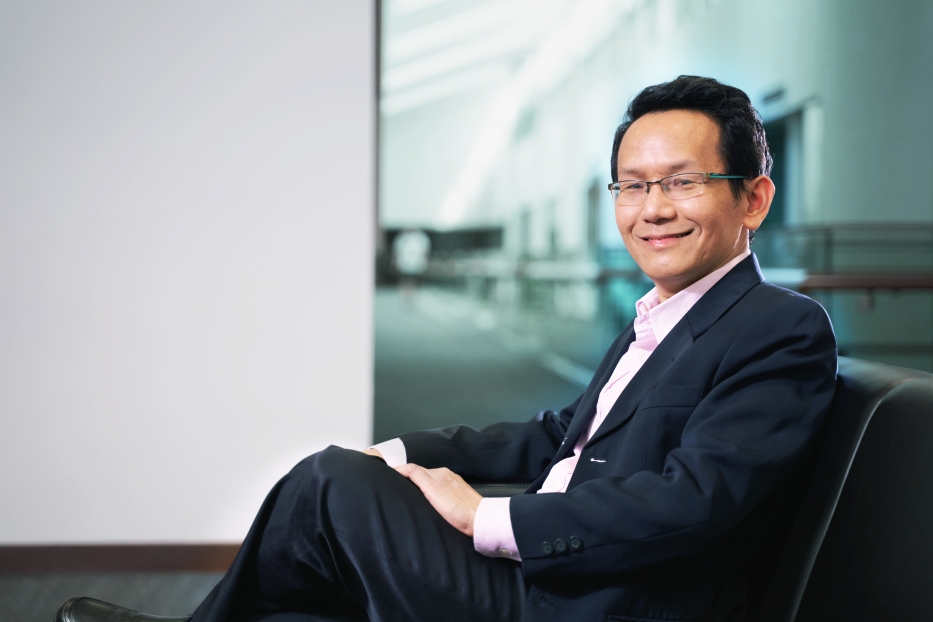Prof Ho Kong Weng

Feature on Ho Kong Weng, Associate Professor of Economics (Education)
School of Economics, Singapore Management University
Creating opportunities to enhance social mobility in Singapore
An inclusive society requires the right policies to be in place, but at the same time, it is important that individuals cultivate a sense of altruism and care for those around them. Through his research and teaching, Associate Prof Ho Kong Weng is shedding light on how we can better empower less fortunate youths to climb the social ladder.
Since its independence in 1965, Singapore has achieved impressive economic growth, along with a high level of upward mobility. But more challenges lie ahead as we enter a new normal and much more uncertain world.
“As a small state and an open economy, the key to Singapore staying competitive is to remain open – be it to new ideas, technologies, capital, or foreign talents,” says Ho Kong Weng, Associate Professor of Economics at Singapore Management University. He emphasises that the influx of foreign human capital is an especially important factor. “We have to be open-minded, so that foreign professionals can embrace Singapore as their new home, and feel like they want to contribute to our society.”
Ho’s research interest covers both the macro aspects of the economy, as well as at the family level, with a focus on intergenerational mobility, and the inequality of Singapore society and economy.
He explains that the economic growth of Singapore has to be inclusive, otherwise, with a skill-biased technological progress, it is inevitable that inequality will rise. Therein lies the importance of studying the transmission of economic and non-economic capital across generations. In particular, it is crucial to understand and enhance the opportunities provided for young people, especially those from disadvantaged family backgrounds, he says. In his work, Ho’s work explores how these individuals can move up the social ladder and improve their economic status relative to their parents. “This is a crucial indicator of the wellbeing of a society – that people have access to opportunities that can lead them to achieve social mobility regardless of their economic and social background.”
Sharing a deeply personal and powerful anecdote, Ho reveals that his own parents were not educated, having only completed a few years of primary school education. “But despite that, their son holds a PhD. This shows that education is actually an enabler for individuals in Singapore who come from a less well-to-do background, and my own experience is an example.” He was therefore inspired to study intergenerational social mobility, in the hope of helping more young people in the same way.
Undercurrents of inequality
In one of his papers, Ho examines the challenges to social mobility in Singapore by using a theoretical model which endogenises both inequality and upward mobility. He explains that while we can check and quantify inequality over time, this approach presents only a static notion of disparity within a society.
“In order to better the lives of individuals within a society, we need to identify the undercurrent that is leading to persistent inequality. That way, we can craft policies to address the underlying issue and provide lower-income families with more opportunities to climb up the social ladder,” Ho says. In the paper, he analysed key past events and future scenarios, including the past influx of and future reduction in migrant unskilled workers, preference shifts towards equity, early education intervention, and future jobs.
The study also proposes that social wellbeing should be used as the yardstick for various social mobility strategies. This is because the research found that non-economic aspirations such as family-oriented and altruism-oriented life goals matter significantly to youths in Singapore. For example, government policies can concentrate on fostering a caring society with community support and family participation. Ho elaborates that policy alone is not sufficient for creating a better, more inclusive society. “We still need to cultivate a sense of altruism, and that matters much more to the social compact of the society. After all, economic prosperity is not the only thing that we should pursue individually or as a nation. We need to bear in mind that there are more important things.”
Lessons for next gen economists
Over the years, Ho has received numerous Excellent Teacher Awards. He says that he enjoys the process of learning and it’s something he would like to impart to his students. He encourages them to be curious about what’s around them, and always think about how to relate economic concepts to the real world. “It’s not just about mathematical models, although for economics students, that should be a given. My philosophy is to cultivate in them a kind of intuition in explaining economic or even non-economic phenomena through the lens of an economist.”
For instance, in exams Ho would set questions that required his students to provide intuitive explanations based on mathematical frameworks. “I wouldn’t ask them to derive mathematical theorems or prove XYZ – that’s not difficult if you just sit down and drill yourself on how to do it mechanically. An important education in economics is one that teaches them how to explain the models, and why or how they are using them.” This is an important skill that will benefit students in the long run, and way beyond school, he says.
Another lesson Ho hopes to instill in his students is a sense of empathy and awareness for people around them. He shares that most of them come from middle-class families and only a minority are from less well-to-do backgrounds. “In my teaching, I am conscious of letting them know about the challenges faced by people coming from the lower income groups. Hopefully they’ll remember what I’ve said and think of research as a way to help the poor move up the social ladder to create a better, more inclusive society,” he says.